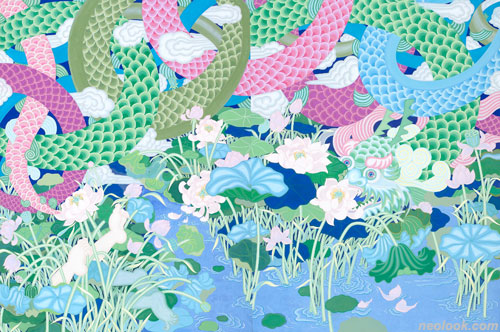- ● homepage
- ● archives
- ● restoration
- ● books
- ● big banners
- ● post board
- ■ neo's search
- ■ about us
- ■ 게재방법 안내
- 개인정보처리방침

- [email protected]
- Tel. 02_335_7922
- Fax. 02_335_7929
- 10:00am~04:30pm
- 월요일~금요일
- 3/3(월) 대체공휴일

A Tale of Dragon
고아빈展 / KOHABIN / 高雅彬 / painting 2012_1003 ▶ 2012_1009 / 월요일, 추석 당일 휴관
● 위 이미지를 클릭하면 네오룩 아카이브 Vol.20070711f | 고아빈展으로 갑니다.
초대일시 / 2012_1003_수요일_05:00pm
관람시간 / 10:00am~07:00pm / 입장마감_06:30pm / 월요일, 1월1일, 설날, 추석 당일 휴관
목인갤러리 MOKIN GALLERY 서울 종로구 견지동 82번지 Tel. +82.2.722.5066 www.mokinmuseum.com
(어떤 것)에 관한 이야기 _ A tale of (something) ● "성을 필요하며 위험하고 동시에 귀중한 것이라고 넌지시 암시하는 것은 성에 관해 말하는 일을 언제나 다시 시작하도록 부추기기 위해서가 아닐까?" (미셸 푸코, 『성의 역사-지식의 의지』 중에서) 나의 일상은 종교를 지니고 평범하게 살아가는 모범적인 학생이었다. 그러나 사랑의 감정은 나의 일상을 요동치게 하였다. 사랑의 감정은 지금껏 경험해보지 못한 다양한 감정을 일으켰고, 내 안의 다른 나를 발견하게 했다. 스스로 통제할 수 없는 환희와 절망, 기쁨과 아픔이 예고도 없이 찾아왔다. 삶은 이전에는 경험하지 못한 흥미롭고 매력적인 세계로 변하였다. 그러나 사랑의 감정은 현실에서는 아름다운 것만은 아니었다. 하얀 눈이 길가에 내려앉은 순간, 잿빛으로 녹아버리듯이 내 사랑의 감정은 광활한 들판에 내던져진 채로 끊임없는 사건사고에 휘말렸다. 가해자도 피해자도 모두 내 자신이 되는.
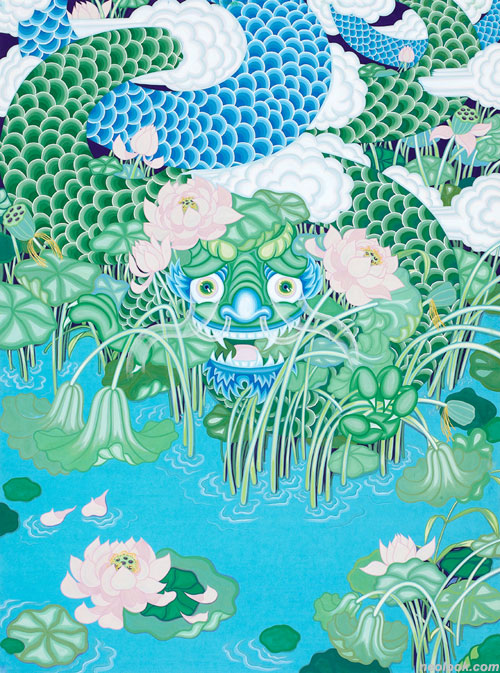
- 고아빈_A Tale of Dragon_scene #2_순지5배접, 채색_130.3×97cm_2011
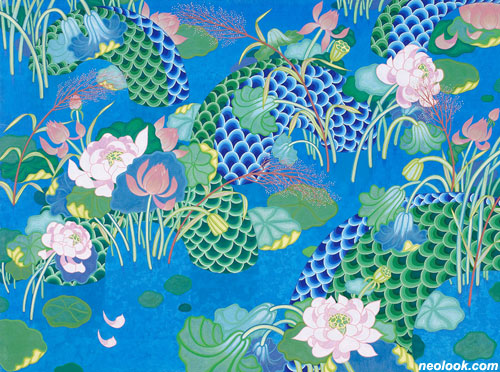
- 고아빈_waiting for (something)_순지5배접, 채색_97×130.3cm_2011
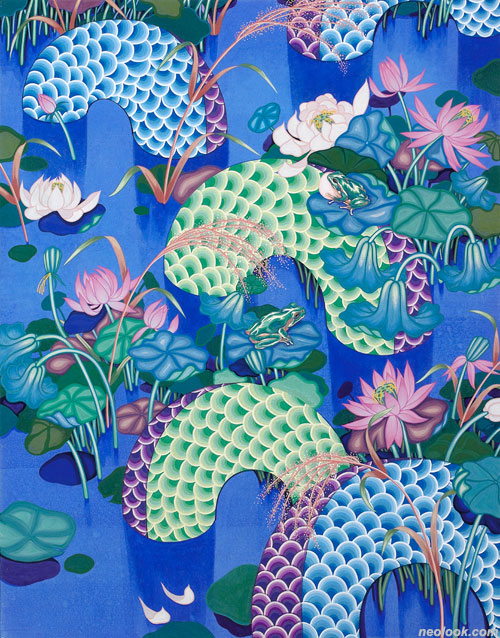
- 고아빈_waiting for (nothing)_순지5배접, 채색_116.7×90.9cm_2011
'왜 사람은 끊임없이 성에 호기심을 가지고 왔음에도 개인적인 경험을 고백하고 발설하는 것은 금기시할까? 우리는 꼭 한 사람만을 사랑하고, 부부의 연을 맺어야 할까? 첫경험에 호기심을 가지면서도 그러한 호기심이 공공연히 밝혀지는 것을 두려워할까? 정신적 사랑은 범죄가 되지 않으면서, 육체적 관계는 범죄가 될까?' ● 그러한 무수한 의문들은 나에게 성(性)과 관련된 작업을 하게 하는 결정적 계기가 되게 하였다. 사랑이라는 이름으로 포장되어 아름답지만, 치욕이라는 이름으로 조롱 당하고 버려지기 쉬운 인간의 성(性), 이 아름답고 상처받기 쉬운 성은 사회와 문화 속에서 구속 받고 평가 당한다. 나는 사회의 약속과 도덕, 문화 등의 형성이 모두 성의 거대한 역사 속에 녹아있다고 생각한다. 낭만적인 연애도, 기성세대와 사회에 대한 반항심도, 권력의 서열다툼도 모두 그 안에 있었으며, 일상적인 사생활에까지도 은밀히 분출되었다. 2012년 이번 전시 [A Tale of Dragon]은 인간이 규정한 사회와 문화 속에서 문제와 혼란을 야기시키는 성과 나약한 인간의 갈등을 [처용설화]를 바탕으로 풀어낸 것이다. 처용은 바람난 아내를 보았는데도 불구하고, 화내거나 괴로워하지 않고 가무(歌舞)로 그러한 상황을 처리하고 있다. 처용의 가무를 관대함을 지닌 사람의 사랑과 호방함으로 보는 시각이 많다.
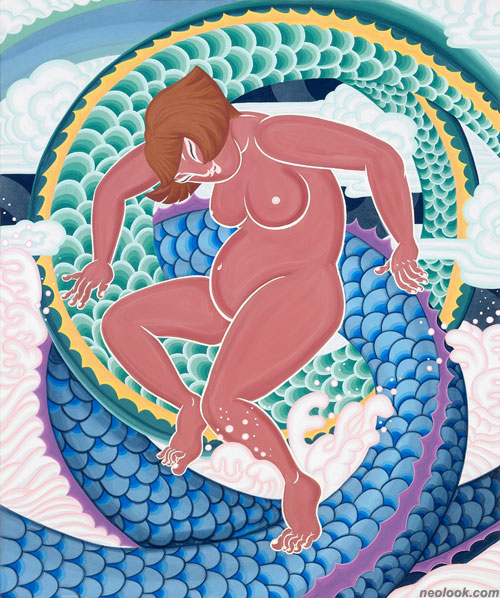
- 고아빈_dancing 1_ 순지5배접, 채색_72.7×60.6cm_2010
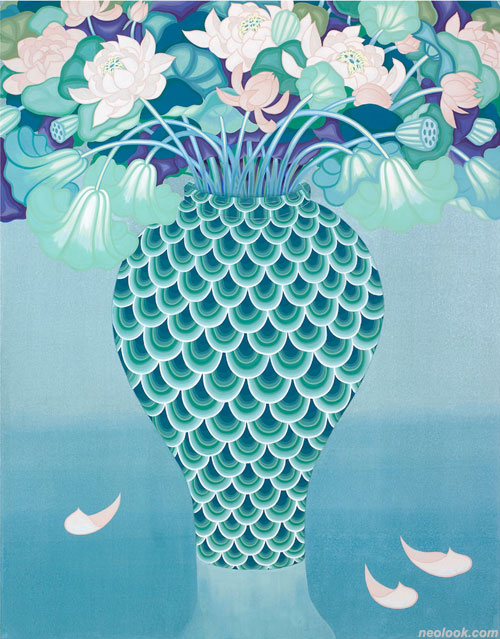
- 고아빈_lotuses in the green vase_순지5배접, 채색_116.7×90.9cm_2011
과연 처용의 행위가 성인군자의 아량에서 나온 것일까? 내가 사랑하고 믿었던 사람이 다른 사람과 잠자리를 하고 있는 장면을 눈앞에서 목격했을 때, 춤추고 노래 부를 수 있는 사람이 과연 몇사람이나 될까? 인간은 전통적으로 내려오는 사회•문화적 특수성과 타인과의 관계 속에서 수많은 규율을 정하고, 지키기를 스스로 감시한다. 동물적인 본능과 인간적인 이성의 갈등은 여기에서 시작한다. 그런데 본능을 이야기할 때, 성의 에너지만큼 강력한 것은 없다. 게다가 성은 동물적으로만 이야기하기에는 너무도 인간적이다. 사랑이라는 복잡•예민한 감정이 있기 때문이다. 그런 면에서, 처용은 인간사회에서는 존재할 수 없는 인물이다. 처용의 행위 또한 이해되기 어렵다. 그래서 나는 처용을 순수한 에너지로 보았다. 처용의 순수한 에너지는 인간 사회에서 어떤 작용을 할까? 이 궁금증을 시작으로 3년 동안, 설화 속의 각각의 인물들을 바라보는 관점을 변화•이동시켜 가며 작업했다. ● 작품 속에서 용은 연꽃이 흐드러진 연못을 헤집고 다닌다. 불교에서 연꽃은 깨달음을 상징한다. 제 꽃잎에는 조금의 더러움도 묻히지 않은 채, 스스로의 몸에서 피고 진다. 그런데 연꽃은 더럽고 축축한 진흙더미에서 핀다. 이 진흙더미로 용이 내려온다. 그리고 전혀 심각하지 않은 우스꽝스러운 표정으로 여러 상황을 맞이한다. 사실, 성에서 비롯된 여러 문제들이 심각하고 무거워진 것은 인간만의 우월함에서 나온 것 같다. 성의 욕망과 본능은 얼마든지 인간의 이성적 의지로 제어하거나 컨트롤할 수 있다고 믿는 막연한 자신감, 그 자체가 실은 블랙코미디인 것이다. 용은 언제나 그대로 인데, 어느 연못으로 가느냐에 따라 소소하게 혹은 권위적으로 변한다. 그러니 용이 '가랑이가 네 개'인 것을 보고 성질이 나서 미쳐 날뛰었는지, 용서하기 위해 스스로 명상하며 치유한 것인지, 아니면 그냥 놀다 들어온 길에 술 취해 비틀거린 것인지 아무도 알 수 없는 일이다. 그런데 오히려 그 모습을 보는 관찰자들이 심각하다. 그리고는 우아하고 교양 있는 방법으로 결론 내리려 한다. 용이 모든 것을 용서했고, 역신은 도망갔으며, 부인은 아무 잘못 없다고 말이다. 우리는 왜 이렇게 성의 문제에 대해 감추고 포장하려 할까? 사회는 왜 성적 에너지를 자꾸만 억압하고 구속하려 하는가? 정말로 우리의 본능과 순수한 에너지가 우리가 뜻하는 바대로 관리 될 수 있는 것인가? ● 나는 앞으로도 성의 문제를 연못의 진흙탕 같이 바라보는 사회의 제 문제들을 들여다볼 것이다. 잘 알지도 못하면서, 때로는 매우 심각하게, 또 때로는 별로 대수롭지 않게 웃으면서 수많은 질문들을 내 앞에 마주하게 될 것이다. 그러한 답을 찾아 떠나는 여행이 아마도 나의 작업이 될 것이다. ■ 고아빈
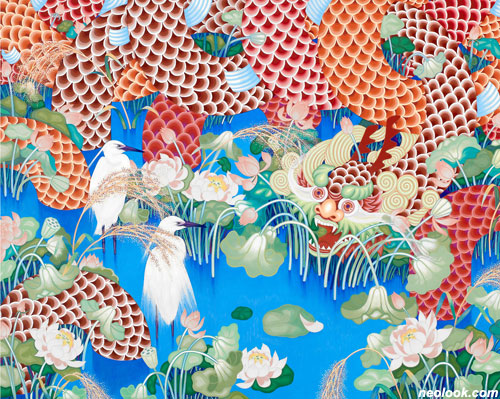
- 고아빈_A Tale of Dragon_scene #3_순지5배접, 채색_162.1×130.3cm_2012
A tale of (something) ● It is not with the aim of inciting people to speak of sex that it is made to mirror, at the outer limit of every actual discourse, something akin to a secret whose discovery is imperative, a thing abusively reduced to silence, and at the same time difficult and necessary, dangerous and precious to divulge? (Michel Foucault, 『History of Sexuality: The Will to Knowledge』) ● As a routine: I used to be a regular kind of gal with faith in God and a normal student life. But one thing had changed it all—the feeling of love. The feeling of love gave rise to all kinds of emotions that I had never felt before, and all the unprecedented emotions gave me a chance to reflect on myself and find a new "me". Without notice, uncontrollable delight and despair, joy and pain came about my routine. A sudden alteration in my life occurred, and all began to be perceived more attractive and interesting. But it is not a wonderful thing, the feeling of love, in reality; rather, it gave birth to inevitable turmoils and twists as if white snowfall immediately turns black after touching the earth. My feeling of love was one of those left abandoned on a barren land: the assailant and the victim, all at once. ● 'Why do we let ourselves forbid from revealing and confessing our personal experiences about sex, while we never stop having interest in it? Should we really commit ourselves to only one person, and then engage in matrimony? Why do we, show immense interest on the 'first time' (of others and ours), yet fear its uncovering to the others? Why then, the imagination isn't a crime, when the physical act can be? ● These questions—and countless more—have become the central focus of my work: sex. Sex: beautiful as it is carefully caressed in the name of love; ridiculed under its properties of disgrace; l'amore, fragile and beautiful, has constantly been assessed and confined in discourses within our culture and society. Indeed, I believe the society roots itself of its promises, ethics, culture, etc., all in the epic of sexuality. Whether it be a romantic love story, resistance against the social norms and the pre-conceived, power plays and rank challenging, it all finds itself based on sexuality, let alone our everyday lives. This exhibition, which I've titled "A Tale of Dragon", is my own interpretation of the Korean folk fable "Chu-yong-seul-hwa", in which one may observe chaos and problematic of sexuality and conflict of mankind within a society and culture regulated by man. The protagonist, Chu-yong, despite witnessing a sexual affair of his wife, he does not push himself to anger or agony. Instead, he sings and dances away his dilemma. A common observation of such act makes him magnanimous, as being extremely tolerant and thus an icon of leniency. ● But is it really so? Does his act of tolerance genuinely sprout from magnanimity that only saints may possess? How many people would actually dance and sing after witnessing their loved ones having a sexual affair? Throughout history (and in some cases traditionally), mankind has self-censored their thoughts and acts under a set of rules that they have imposed on themselves. Instinct and rationality come in to play here. But when speaking about instincts, nothing surpasses sexuality. Moreover, the sexuality I speak about does not confine itself to our nature as animals; rather, it is humane because of the complexity and sensibility that underscore its existence. In that aspect, Chu-yong is a character that can only be possible in a fiction. Furthermore, his actions cannot possibly be understood. Thus, it was reasonable for me to see him as an energy, rather than a being. How does the pure energy of Chu-yong act within the real world? This very question has guided me for the last three years to delve into each character of the fable, standing from their perspectives, moving myself as an omniscient being from one to another. ● In A tale of dragon _scene #1, the dragon—Chu-yong—roams through a pond of lotuses. In Buddhism, lotus symbolizes enlightenment. Without any imperfections to the petals its flower, the lotus silently blooms and dies. But lotuses bloom upon mud: the dirty, and damp state of earth. And the dragon descends to this clamminess. And without any seriousness whatsoever, it encounters various situations as it roams about. Frankly, most 'problems' that arises out of sexuality have become grave or severe due to the superiority of mankind. The vague confidence in which human beings believe that they are capable of controlling their sexual desires or instincts by own will itself is a black comedy. The properties of the dragon remain the same; however, they alter slightly, in accordance to the pond the dragon descends on, trivial or prescriptive. Therefore, it is impossible to find out if the dragon has lost its reason after seeing 'four legs', or healed itself to pardon by meditation, or, stumbled upon the scene after coming home drunk. Nonetheless, the observers are serious. And they try their best to conclude in the most elegant, sophisticated ways. The dragon has already forgiven, the incubus fled, and the wife had made no mistake. Why do we, as the observers did, try to conceal and roundabout the problematic of sexuality? Why does the society repress and confine sexual energy? Is it really possible to control our instincts and pure energy as we please? Declaration: I will continue to explore the ritualistic, prejudiced views of our society on sexuality. I'll definitely be facing questions that I may not understand, however, by being serious sometimes, and being carefree the other, I would be able to answer them in my own ways. And my works to come will reflect the questions and answers I find on the way. ■ A-bin Koh
Vol.20121003d | 고아빈展 / KOHABIN / 高雅彬 / painting

